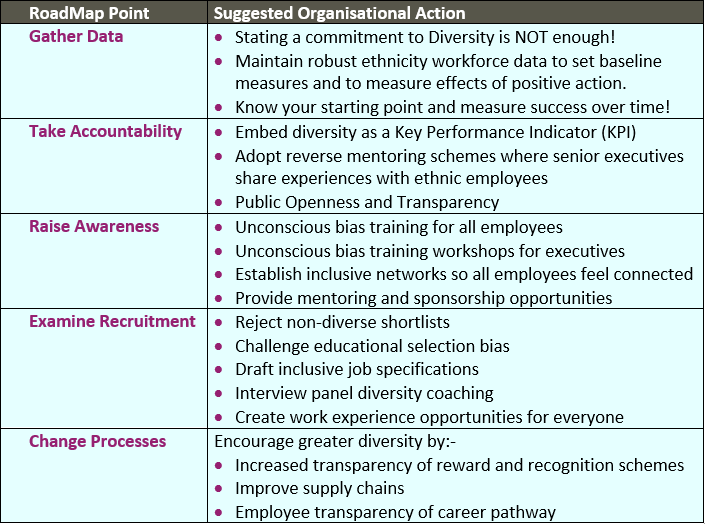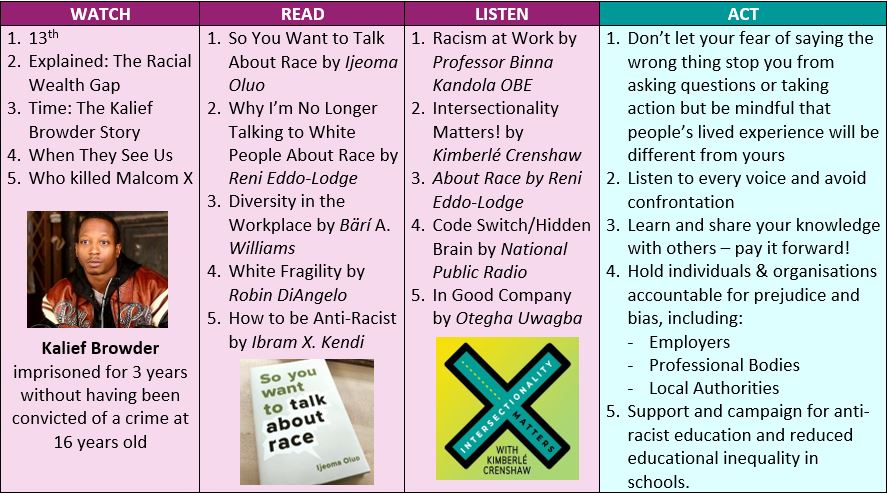Following our statement ‘Enough is Enough’ in response to the #BlackLivesMatter movement, feedback from our readers suggest that guidance on what tangible action can be taken by individuals and their organisations may be helpful to tackle racial inequality in their workplace.
Why take action now?
Following the brutal killing of George Floyd in the US and clear health-related racial inequalities facing UK Black Asian and minority ethnic (BAME) people during the Covid-19 crisis, individuals and organisations must now be challenged to understand the enduring realities of racism and inequalities in our workplaces and society.
BAME members of society, particularly Black African, Black Caribbean, South Asian and other minorities face the following workplace inequalities when compared to white British workers, regardless of age, prior experience, and education (Li and Health, 2020):
- Higher risk of unemployment
- Lower levels of earnings than white British workers
- Delayed re-entry and wage penalties following unemployed periods
- Lack of managerial and leadership representation
- Higher reported incidences of bullying and harassment
Lack of opportunities in the British workforce for (BAME) people results in organisations wasting available talent and expertise which could help them to increase their creativity and productivity, attract more clients, and grow faster. In times of an economic and health crisis, such as we currently face, addressing the ethnicity pay gap would help to diversify wages and productivity of the economy and reduce inequalities across communities, making our society fairer.
Racism and lower levels of opportunity starts with education from the earliest years in school. It continues with fewer opportunities for further and higher education and continues in the workplace. If we are going to make a difference, we all need to lobby our MPs to ask for changes to the curriculum in schools to increase diversity in teaching and teachers. We need to learn about the history of Black people in the UK and how the British Empire has left a legacy of disadvantage for descendants of people in the former colonies. We need to have examples in books and media that Black people can relate to so that they feel respected and have a sense of belonging. We need to continue this education in the workplace.
We believe that:
‘It’s time to end racism at work’
(CIPD People Management Magazine, July/August 2020)
Government Resources to help tackle workplace racism
The McGregor-Smith review (2017) outlines recommendations to British employers to tackle work-place racial inequality via a 6-point roadmap:-

What is Workplace Unconscious Bias Training?
As part of the Raise Awareness recommendations, McGregor recommends Workplace ‘Unconscious Bias Training’ (UBT). Unconscious (or implicit) biases, unlike conscious biases, are the views and opinions that we are unaware of; they occur automatically and are outside of our conscious awareness. Unconscious biases affect our everyday behaviour and decision making and are influenced by our background, culture, context, and personal experiences. In Unconscious Bias Training, participants learn how to reduce the negative impact of bias on organisational practice and individual behaviour (Atewologun, Cornish, and Tresh, 2018).
Impact offers workshops and employee coaching in unconscious bias training to enable employees to learn about the negative impact of biases on BAME applicants and employees, including biases towards women.
Opening up conversations at work
Talking about racism helps people understand what it’s like to be in a minority and challenges individual beliefs and values. However, issues may have to be overcome before frank and honest discussion can be realised such as defensiveness that some white people may have and fear of speaking out by black colleagues. BAME employees must be given a safe platform for their voices and concerns to be heard alongside those of white employees to ensure that open dialogue results in everyone moving forwards and making positive change together. Skilled facilitation of these conversations is essential to realise the benefits of increased understanding, support and sharing experience.
Impact offers skilled facilitators to co-ordinate effective group discussions on race inequality and discrimination issues in the workplace enabling a greater understanding of employee experiences of racial harassment or bullying and to explore perceptions of how employers are promoting equality, diversity and fairness in the workplace.
What can YOU do?
Our team at Impact have compiled a list of some personally recommended material for you to watch, read or listen to including 5 series on Netflix, 5 books and 5 podcasts; these resources helped educate us on anti-racism and black oppression history. Turning knowledge into action however is key to driving forward positive change so we have also listed some ways that YOU can make a difference:-

We can all contribute to make a difference!
Impact can help your organisation review its current policies, employee data and recruitment process and journey with you along the roadmap to meet all the recommendations in the UK Governments’ McGregor-Smith review (2017). We can help your organisation create a diverse workplace and prevent racial discrimination via our diversity and inclusion training, unconscious bias training workshops and facilitated discussion focus groups. Let’s tackle racial inequality together!
References
- CIPD (2020). It’s time to end racism at work. People Management Magazine, July/August 2020.
- Li, Y., and Heath, A. (2020). Persisting disadvantages: a study of labour market dynamics of ethnic unemployment and earnings in the UK (2009–2015). Journal of Ethnic and Migration Studies, 46(5), 857-878.
- McGregor-Smith, R. (2017). Race in the Workplace: The Mcgregor-Smith Review. Report for Department for Business, Energy, and Industrial Strategy. Available at https://www.gov.uk/government/publications/race-in-the-workplace-the-mcgregor-smith-review
- Atewologun, D., Cornish, T. and Tresh, F. (2018). Unconscious bias training: An assessment of the evidence for effectiveness. Equality and Human Rights Commission Research Report Series. Available at https://www.equalityhumanrights.com/en/publication-download/unconscious-bias-training-assessment-evidence-effectiveness